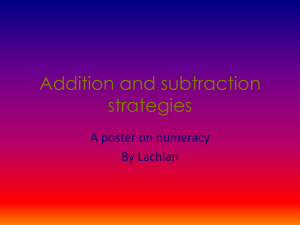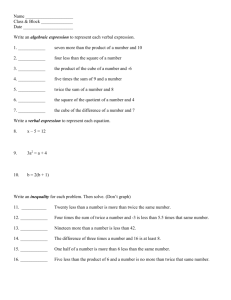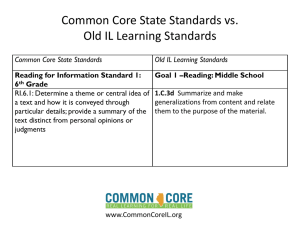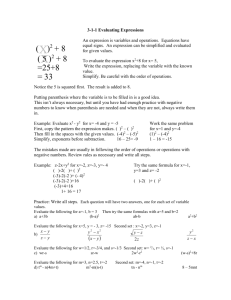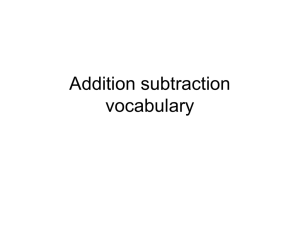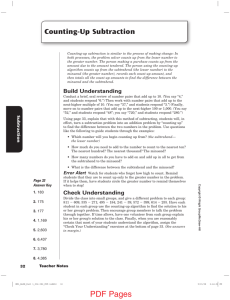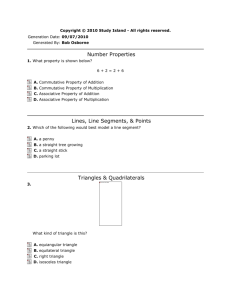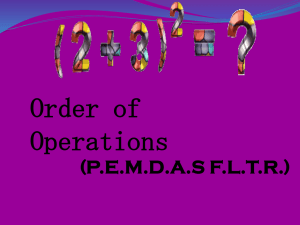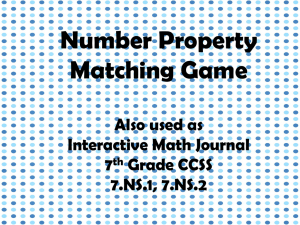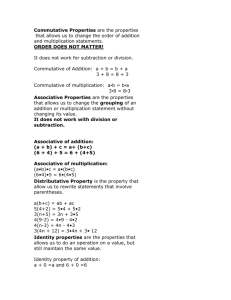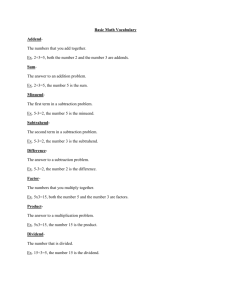2_ addition and subtraction whole numbers and decimals
advertisement
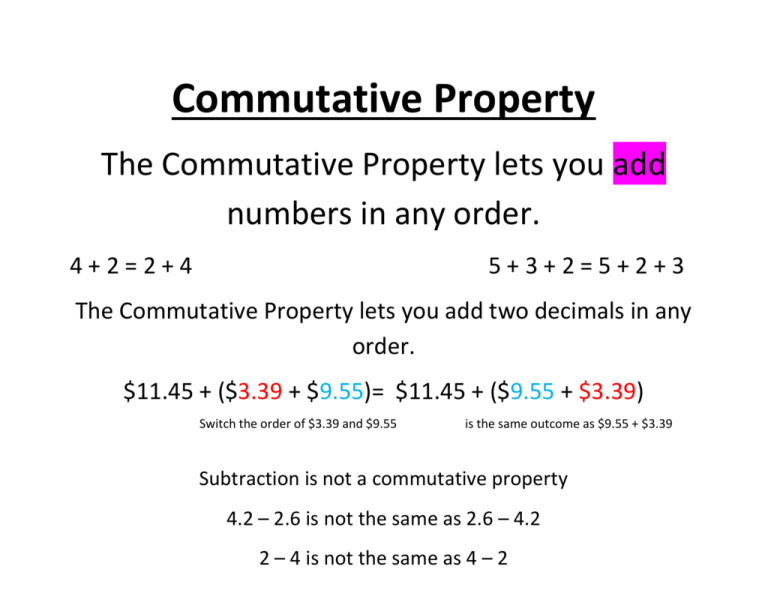
Commutative Property The Commutative Property lets you add numbers in any order. 4+2=2+4 5+3+2=5+2+3 The Commutative Property lets you add two decimals in any order. $11.45 + ($3.39 + $9.55)= $11.45 + ($9.55 + $3.39) Switch the order of $3.39 and $9.55 is the same outcome as $9.55 + $3.39 Subtraction is not a commutative property 4.2 – 2.6 is not the same as 2.6 – 4.2 2 – 4 is not the same as 4 – 2 Associative Property The associative property states that you can add regardless of how the numbers are grouped. By 'grouped' we mean 'how you use parenthesis'. If you are adding it does not matter where you put the parenthesis. Compensation Adjust one or both numbers to make the calculation easier. Then adjust the difference or sum to get the final answer. Subtraction Addition Whatever you do to the first number, you have to do the opposite to the answer. 14 – 8 = ? (-4) 14 – 8 = ? +4 10 – 8 = 2 18 – 8 = 10 (+4) (-4) 14 – 8 = 6 14 – 8 = 6 14 + 8 = ? 14 + 8 = ? (-4) (+4) 10 + 8 = 18 18 + 8 = 26 (+4) 14 + 8 = 22 (-4) 14 + 8 = 22 Estimate To give an approximate value rather than an exact answer. There is more than one way to estimate a sum or difference. You can use rounding or compatible numbers by replacing number with other numbers that are close and easy to calculate mentally. 628 + 485 = 1,113 628 rounds to 630 And 485 rounds to 490 630 + 490 = 1,120 628 rounds to 600 And 485 rounds to 500 600 + 500 = 1,100 Compatible Numbers Are numbers that are easy to compute with mentally. Compatible numbers are ones that result in multiples of ten or one hundred when the operations are completed. 25 + 87 + 75 = ? We call 25 and 75 compatible numbers because their sum is 100. Adding 25 and 75 first allows us to be able to mentally complete the addition of 25 + 87 + +75 = 87 + 100 = 187 Underestimate An estimate that is less than the actual answer. Overestimate An estimate that is over the actual answer. Inverse Operations Operations that undo each other: Adding 6 and subtracting 6 are inverse operations. Reasonableness Is your answer reasonable? Is your answer close to the exact/estimated answer? Use many other techniques for estimating sums and discovering if your answer is reasonable. Strip Diagram Strip Diagram is a tool designed to help solve math word problems accurately and efficiently. The model provides an image that organizes information and simplifies the problem solving process. Alicia has $6 more than Bobby. If Bobby has $10, how much did they have altogether? Addend Any numbers that are added together. Sum The total amount resulting from the addition of two or more numbers. 8 + 3 = 11 the “8” and “3” are addends and the “11” is the sum. Minuend, Subtrahend, and Difference Minuend- The first number in a subtraction. The number from which the other number will be subtracted. Subtrahend- The number that is to be subtracted. The second number in a subtraction. Difference- The result of subtracting one number from another. How much one number differs from another. minuend - subtrahend = difference Solution The value of the variable that makes the equation true. Addition Nate has a $5 bill and a $10 bill. He spends $2.50 for a smoothie and $2 for a muffin. How much money does he have left? How much does Nate have in total? ($15) How much does he spend? ($4.50) What is $15 $4.50? (solution) Multiplication If you had the equation "x + 6 = 11", you would write "–6" under either side of the equation, and then you'd "add down" to get "x = 5" as the solution. x + 6 = 11 –6 –6 x = 5 Evaluate To find the value of an expression when a variable is replaced by a number. Evaluate the cost of each pie if 3 pies cost $6. Answer: $2 each. Problem: Jeanne has $17 in her piggy bank. How much money does she need to buy a game that costs $68? Solution: Let x represent the amount of money Jeanne needs. Then the following equation can represent this problem: 17 + x = 68 We can subtract 17 from both sides of the equation to find the value of x. 68 - 17 = x Answer: x = 51, so Jeanne needs $51 to buy the game. In the problem above, x is a variable. The symbols 17 + x = 68 form an algebraic equation. Equation An equation says that two things are the same, using mathematical symbols. An equal sign (=) is used Example: 7+2 = 10-1
